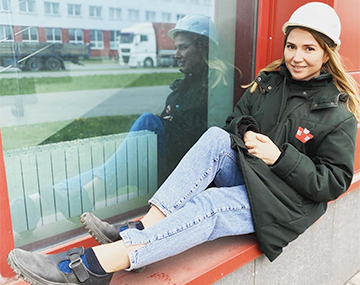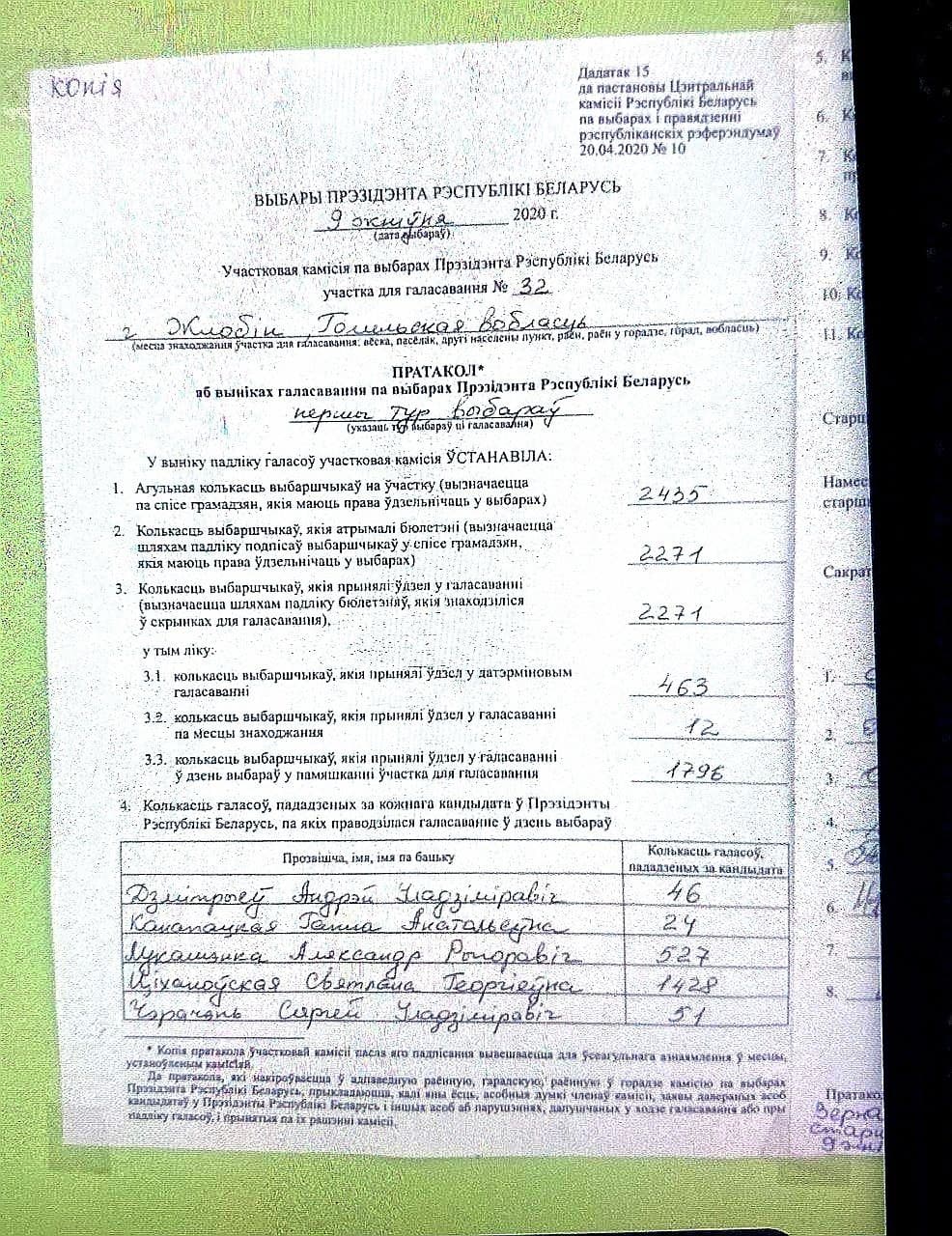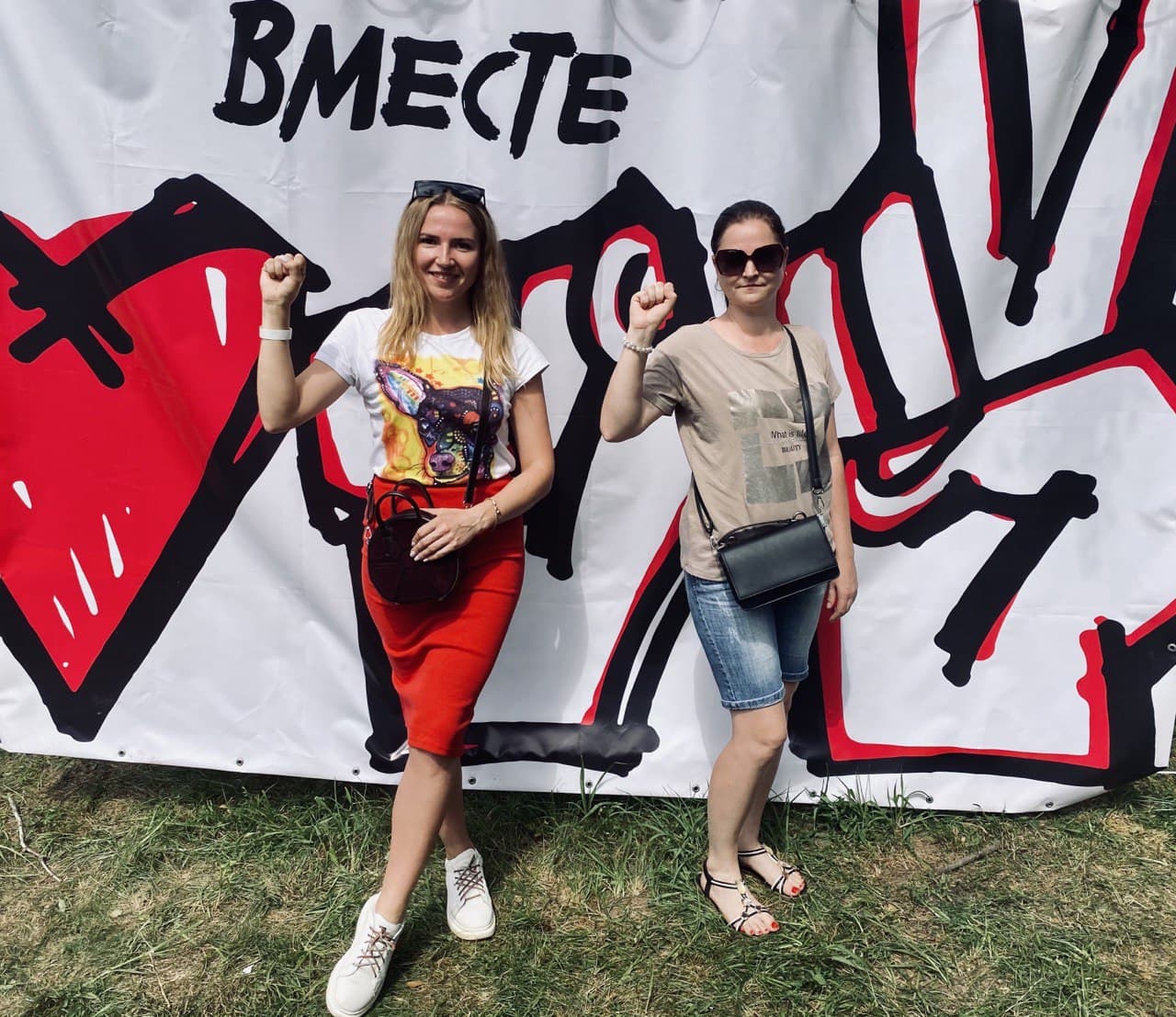"In Terms of the Strength of the Protests, Zhlobin Became the Second after Minsk, and People Still Do Not Give Up"
2- 3.03.2021, 12:16
- 2,950

The former ideologist spoke about the strike and the mood of the BMZ workers.
Sniazhana Pahodzina, a former employee of the ideology service of the Belarusian Metallurgical Plant, told Salidarnasts about interrogations, trials, searches, and goats that did not obey the demands of the police.
- I was told that I have no right to discuss the tasks of the management, because we, the ideologists of the enterprise, must support the state ideology. An ideologist cannot have any personal point of view. I replied that I couldn't do that and wrote a letter of resignation, - Sniazhana Pahodzina from Zhlobin says.
For seven years she worked in the corporate edition of BMZ, and on October 26, she decided to support the People's ultimatum announced by Sviatlana Tsikhanouskaya. Then, the interlocutor began her speech to her colleagues with the words: "I am the wrong ideologist."
Surprisingly, while still working in the management of ideology, this girl managed to become an independent election observer and survive the trial. Sniazhana Pahodzina has already had three searches, in connection with which she notes with irony: "Only the first time is scary."
- Several years ago, our newspaper Metallurg, which was an independent publication, was included in the ideological service of the plant. Nobody asked the collective's consent to this. But I didn't feel any particular difference. My task was to write everyday reports about factory workers, about their work, hobbies, etc., - says Sniazhana, who now works for the independent publication Strong News.
Like many, Pahodzina first experienced a strong shock last summer. Sniazhana decided to become an observer, not from the enterprise where she worked quite well but an independent one.
- At that time I was acting chief editor. Many in the city know me, including at school, where I began to observe at one of the two sites.
In our precinct, independent observers were allowed into the school building but not into the precinct itself, while in most other precincts, the observers were forced to be on the street altogether. I did not feel any loyalty to myself because of my position, just like everyone else, I was not allowed to approach the tables and ballot boxes and was kicked out of the counting by the police, - the journalist recalls.
On August 9, at the polling stations in secondary school No. 13, observers, together with caring residents of Zhlobin, awaited protocols with the counting of votes until half-past one in the morning.
- As a result, they were hung inside the school. To see, I had to look for binoculars. The very moment when the protocols were hung, we filmed with a camera through the glass, then the lights in the building were turned off, and we began to shout that we would write a complaint to the prosecutor's office.
We called the police several times, but they did not want to come. Then, nevertheless, they arrived, they also began to ask to open the door, but then the watchman appeared and said that there was no one else at the school. The commission escaped from us through the back door.
However, the next day, the protocols appeared again. Tsikhanouskaya won at two polling stations in this school with a majority of votes almost three times. At one, there were 527 votes for Lukashenka and 1428 for Tsikhanouskaya, at the second - 558 against 1446.

During the observation, our information did not disagree with the data of the commission. I think they were running away from uncertainty, they were waiting for some command from the district executive committee, they wanted to insure themselves, - the colleague believes.
In total, Pahodzina learned about 8 out of 55 Zhlobin polling stations, where honest protocols with Tsikhanouskaya's victory were posted.
- At work, all this time I was only warned that they were watching me, checking social networks. Our newspaper covered the pre-election campaign in a rather reserved manner. The fact is that, even while acting as editor-in-chief, I could not give any random material because, after me, the issue goes through a bunch of approvals.
Nevertheless, the day after the elections, we did not write, with reference to the CEC, that Lukashenka won. We just noted that the elections took place.
One of the great materials on those events was about the rally on August 14. It was simply impossible not to cover it because a lot of workers gathered and they spoke very emotionally. A report about this then came out right on the front page, - says the interlocutor.
The Day of the People's Ultimatum on October 26 was the last straw for the decision to leave work.
- At that moment, I again replaced one of the chiefs, this time the head of the TV news. I was given the task to write a story that there was no strike at the factory. But in fact, there was no strike at the plant, and I asked why they should make material about it because you can omit this topic.
Then I was told that they would give two people who would tell how much they love Lukashenka and that strikes are bad. But I replied that I would find ten with the opposite opinion.
My superiors didn't like this. Three days later, the main ideologist summoned me and said that I have no right to discuss the tasks of the leadership because we must support the state ideology. An ideologist cannot have any personal point of view. I said I couldn't do that, and wrote a statement of resignation, - Sniazhana says.
The interlocutor of Salidarnasts knows the answer to the question of why the factory workers, who protested so massively in the first days, so quickly calmed down.
- The reason is banal - salaries, loans. Plus, people were divided into workshops and a very powerful work began with them. Each shop has its own boss and its own trade union committee. A former KGB officer Yanhurazau came to the plant as a deputy director; he generally talks with everyone for an hour and a half to two hours.
Personally, I avoided such a conversation, but we often saw each other at work. I have a big white-red-white badge on my backpack, and every time I met Yanhurazau, I noticed how much he didn't like it.
At the plant itself, people's moods are decadent, the situation is tense. Everyone is afraid to say an extra word because no one knows why they may be summoned “on the carpet” to the authorities.
Nevertheless, most workers understand each other without words and silently support protest sentiments. Even in my former department, almost all of my colleagues were in solidarity with me.
But I cannot imagine how it is possible to work fruitfully under constant supervision and pressure. And, by the way, today not only the factory workers themselves know about the true state of affairs, but also people throughout the country. This bubble will burst sooner or later anyway, - the journalist believes.
Repressions against Pahodzina began long before the dismissal. Back in June, Sniazhana held a trial at which she was found guilty of insulting a police officer.
- I could not keep silent, seeing how harshly people were detained in Hantsavichy when the policeman pressed his knee on the man's head. I wrote this employee a private message on social networks: "What are you doing? Doesn't your heart hurt? Please, stop and change your mind!" And at the end, she added an "f" word. He sued not only me then. I got acquainted with the materials of the case, he received over 300 similar messages, and mine was still the softest, - Sniazhana recalls.
At the trial, she did not deny her words, she received a fine in the amount of 10 basic as a punishment.
- Then the first search took place. They summoned me with a summons, but it did not indicate as whom and in what case. I knew one police chief from work, and I came to him to clarify. And he introduced me to the lieutenant colonel of the Brest police, who came to hold a preventive conversation with me!
However, this was a real interrogation. They drew up a protocol against me, looked for some correspondence on the phone, but did not find it. Then they said that they had to go home with a search.
That first search lasted only half an hour. We examined everything superficially, looked for equipment, but I had neither a computer nor a laptop, - says the girl.
On October 8, she was detained right at her workplace at the factory:
- I was then collecting signatures in support of Vital Saveljeu, who was illegally fired for his civil position. I had a sheet with signatures on my table, people came from all over the plant and signed. Three people come in wearing ordinary clothes, I thought that they also came to sign the sheet. I show them the appeal, and they show me a badge in return. I did not have time to read anything, they commanded: "Let's go."
They brought me to the department and kept me for 8 hours. They wanted to detain me for a day, but after five hours, my lawyer managed to break through. In her presence, the tactics changed, and they even asked me what I had been doing here for so long as if I had been there at will," recalls Sniazhana.
Her cousin Sviatlana Zyl was left in the isolation ward for three days, and she was detained on the same day. Sviatlana also works at BMZ. The girls were taken from the ROVD to searches.

- The decree said that the search was being carried out as part of a criminal case, allegedly for defamation of the head of the Zhlobin district police department, Henadz Melnik, and the head of the criminal investigation department, Aliaksandr Marsau.
The fact is that, in Zhlobin, there are several channels in which information appears about local police officers with stories about the events in which they took part and personal data.
The police are actively looking for administrators, and suspicion fell on me and my sister. This time the search lasted three hours. I asked what they were looking for, they answered that drugs. They rummaged through everything: looking for a double bottom in ottomans, overturning beds, checking salt, pasta, cottage cheese, milk, opening all the medicines, digging in the garbage can. In the scrap paper, they found scraps of a printed appeal from parents about distrust of teachers after the elections. This appeal was in open sources. They put it together from scraps for a very long time.
They treated me in a boorish way, addressed me only by "you," although I did not know any of them. On the same day, a search was carried out at my workplace, - the interlocutor says.
When asked if she was scared, Sniazhana answers without hesitation:
- It was funny to me because these people acted as if they had seen enough cheap TV shows, threatened me, said that I wanted to seize power, and I was controlled by a channel that was not allowed to name.
After this search, I became interested in the rules of its conduct and realized that there were many violations on their part. They simultaneously searched different rooms without my presence. They brought a police officer with them as an attesting witness, but I demanded that they find a civilian.
The last search was carried out recently at the parents and relatives of Sniazhana, who live in the private sector. During this search, law enforcement officers threatened not only people but also ... goats.
- On one of the neighboring streets, someone hung out a red-green flag with offensive inscriptions. This time the resolution stated that the search was being carried out in connection with the mockery of the national flag.
From all over the street they came only to my parents and my aunt. They looked for flags, checked all the sheds and garages. The aunt had goats in the barn. They are curious and rushed to intercept those entering. They tried to pull the animals away by the horns, but unsuccessfully. And then the militiamen said that if we didn’t remove the goats, they would spray their eyes with tear gas. At the same time, they clarified that "they have the authority to do this," Sniazhana says.
Despite the current passivity of metallurgists, Pahodzina claims that Zhlobin did not capitulate and still stands against:
- The police told me that on the day of elections on August 9, Zhlobin became the second most powerful after Minsk in terms of the strength of the protests. And people still do not give up, the protest can no longer be stifled by anything.









